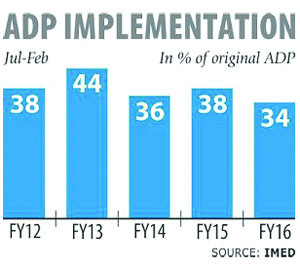Faruque Ahmed
The government is going to approve the revised annual development programme (RADP) at Tk 90,000 crore down from Tk 97,000 in the original development budget for 2915-16. It will be 7 per cent less but 20 per cent higher compared to last year’s budget. The downward revision of the ADP is a regular annual phenomenon under the current regime, to conciliate with the pace of implementation of development projects achieved during the first half of the fiscal year.
The development ministries and divisions were able during the last eight months to spend only Tk 33,209 crore of the Tk 97,000 crore budget which is lowest in equivalent period in last five years, spending only 28 per cent of the budget. Planning Minister AHM Mustafa Kamal approved the initial size of RADP last week in a meeting in his ministry.
The meeting decided that the RADP will be at Tk 88,000 crore, to be placed before the National Economic Council. The prime minister is likely thereafter to add another Tk 2,000 crore to give it the final stamp at Tk 90,000 crore.
Various development ministries who sought additional allocation were told by the planning minister that their implementation performance is unsatisfactory to suggest that they can’t be able to use the additional fund.
Allocation could increase if they could bring in big transformative projects like the Padma bridge and the Matarbari deep-sea port.
The ADP for last fiscal 2014-15, was originally set for Tk 80,315 crore, later revised down to Tk 75,000 crore. In the end, Tk 68,532 crore was spent, according to statistics from the Implementation Monitoring and Evaluation Division. As per the Finance Division, the actual spending was even lower at Tk 59,570 crore.
In the revised budget for this year (2915-16), government’s own fund is likely to be cut by 3 per cent to Tk 60,840 crore, and the foreign fund by 16 per cent to Tk 29,160 crore.
Meanwhile, a Finance Division official quoting the finance minister said the government plans to prepare a separate budget for mega projects next year. He hinted that the ADP budget for the next fiscal 2016-17 is likely to be around Tk 113,000 crore.
The World Bank projected GDP growth in the current fiscal year at 6.5 per cent backed by strong domestic consumption and export sector growth, The Asian Development anticipates the GDP growth at 6.7 per cent.
The implementation of the ADP, experts believe, suffers from inefficiency of leadership and bureaucratic ‘inertia’.
Centre for Policy Dialogue (CPD) Executive Director Mustafizur Rahman identified weakness in institutional capacity in implementing development projects as the reason behind slow progress in ADP execution.
According to Research Director of Bangladesh Institute of Development Studies Mr Zaid Bakht, traditionally ADP implementation remains slow in the first few months due to slowdown in the mobilization of work and funds, in addition to ineffective coordination at different level.
The IMED data shows, 10 big ministries and divisions which are implementing some mega projects including Padma Bridge, metro rail and nuclear power plant spent only 30 per cent of their allocation in an average.
They have received 73 per cent of the total ADP allocation for this fiscal year.
The water resources ministry’s achievement stands at the lowest at 18 per cent of its allocation. The railway ministry spent 19 per cent, health and family welfare ministry 20 per cent, and Bridges Division and Energy and Mineral Resources Division implemented 23 per cent each in the eight month period. The overall lowest spending agencies include food ministry, which spent only 5 per cent of its allocation, while the Posts and Telecommunications Division showed the implementation level at 62 per cent in the July-January period. Expenditure figure shows, 17 ministries and divisions had spent below 20 per cent.
Source: weekly Holiday










